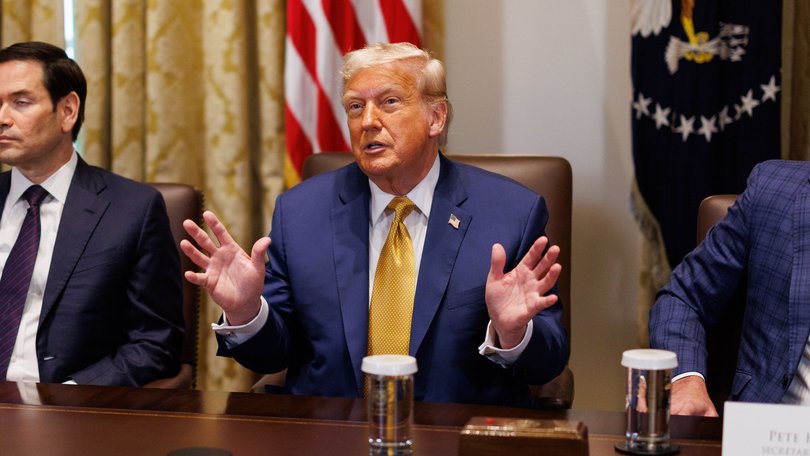Trump tariffs: The US president says he is making America more competitive, but is he?
Economists and industry experts warn that Trump’s sweeping changes to the economy and the country may potentially position the United States to be less competitive on the global stage.

President Donald Trump won his office twice by promising to turbocharge the American economy and restore its global dominance over international competitors. This week, he turned back to his favourite tool, dealing out threats of tariffs like a blackjack dealer confident that the house always wins.
“Tariffs are making our country ‘BOOM,’” Trump wrote on his social media site Tuesday, where he also pronounced the country the “hottest” in the world.
Economists and industry experts, though, warn that Trump’s sweeping changes to the economy and the country may have the opposite effect, potentially positioning the United States to be less competitive on the global stage.
Sign up to The Nightly's newsletters.
Get the first look at the digital newspaper, curated daily stories and breaking headlines delivered to your inbox.
By continuing you agree to our Terms and Privacy Policy.The tariffs are just one pillar of Trump’s industrial policy. I’m taking a look at that aspect, as well as two others, and I’ll explain why some experts fear that six months of Trumponomics could stifle a key driver of American competitiveness: innovation.
Trade restrictions like tariffs are a long-standing strategy for presidents who want to strengthen or bring back domestic industries, a goal that can bolster national security objectives as well as economic ones. Robert Atkinson, president of the Information Technology and Innovation Foundation, said that tariffs could increase national competitiveness — but they come with risks, too.
Tariffs can wall off the American market while other countries trade freely with one another. And they can raise the prices of the goods American companies need to import in order to make their products, forcing them to reckon with higher costs, which their foreign competitors might not face.
That could harm core industries, like automobiles, aerospace and scientific instruments, he said.
“The tariffs will hurt those kinds of companies while helping this kind of Midwestern manufacturer that only sells in the US,” Atkinson said, adding, “good for them, but it’s not going to make America great again.”
Former President Joe Biden sought to revive industrial policy by passing legislation like the CHIPS Act, which gave billions in government support to the semiconductor industry, and the Inflation Reduction Act, which offered subsidies and tax incentives to promote clean energy. Trump’s domestic policy bill slashed many of those energy tax breaks. Makers of solar panels and electric vehicles have warned that the measure will devastate their industries and make China’s advantage in both industries all but insurmountable.
Michael Lenox, a professor at the Darden School of Business at the University of Virginia, said that could leave American companies behind amid a global transition.
“If we’re not careful, we could be investing in yesterday’s technology when these new technologies come about,” said Lenox, who studies innovation and technology transitions. He added, “are we doubling down on Blockbuster in the age of Netflix?”
The United States is not competitive when it comes to factors like labour costs, Lenox said. The key, he said, has always been the country’s knack for promoting experimentation and innovation.
Under Trump, that’s changing, too.
Sabrina Howell, a finance professor at New York University who studies the role of the federal government in supporting innovation, says three intertwined factors have driven economic growth in the past half-century: publicly funded research, the immigration of highly skilled individuals and the country’s robust venture capital system.
“He is currently kneecapping the system in many ways,” Howell said of Trump.
The Trump administration has cut scientific research to its lowest level in decades, New York Times journalists reported in late May, and studies show those cuts could cause long-term economic damage. The cuts — as well as the administration’s crackdown on immigration and international students at schools like Harvard — could make the country less attractive to the world’s top talent.
“If we fail to invest in our basic research and development, if we fail to invest in attracting the world’s best talent, I don’t know if the effects are going to be seen immediately, but down the road, this could be disastrous for the US,” Lenox said.
Experts believe the American system of private capital investment remains an advantage over a managed economy like China’s. But Atkinson said federal funding created the “seed corn” for private investment and that cuts to public funding hobbled the whole system.
This article originally appeared in The New York Times.
© 2025 The New York Times Company
Originally published on The New York Times
